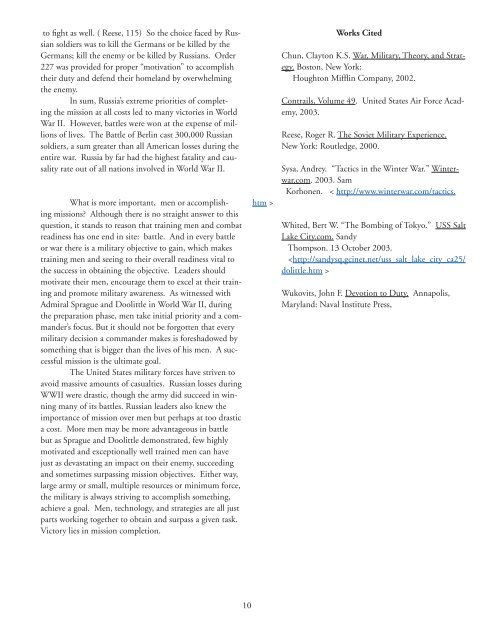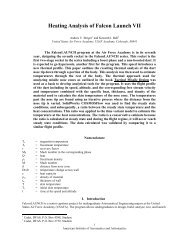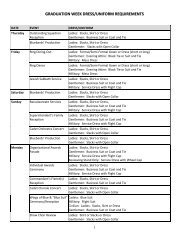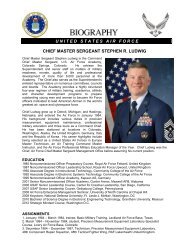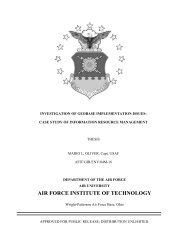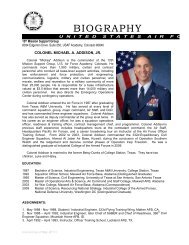Airman Scholar Sp05-1.indd - United States Air Force Academy
Airman Scholar Sp05-1.indd - United States Air Force Academy
Airman Scholar Sp05-1.indd - United States Air Force Academy
You also want an ePaper? Increase the reach of your titles
YUMPU automatically turns print PDFs into web optimized ePapers that Google loves.
to fight as well. ( Reese, 115) So the choice faced by Russian<br />
soldiers was to kill the Germans or be killed by the<br />
Germans; kill the enemy or be killed by Russians. Order<br />
227 was provided for proper “motivation” to accomplish<br />
their duty and defend their homeland by overwhelming<br />
the enemy.<br />
In sum, Russia’s extreme priorities of completing<br />
the mission at all costs led to many victories in World<br />
War II. However, battles were won at the expense of millions<br />
of lives. The Battle of Berlin cast 300,000 Russian<br />
soldiers, a sum greater than all American losses during the<br />
entire war. Russia by far had the highest fatality and causality<br />
rate out of all nations involved in World War II.<br />
What is more important, men or accomplishing<br />
missions? Although there is no straight answer to this<br />
question, it stands to reason that training men and combat<br />
readiness has one end in site: battle. And in every battle<br />
or war there is a military objective to gain, which makes<br />
training men and seeing to their overall readiness vital to<br />
the success in obtaining the objective. Leaders should<br />
motivate their men, encourage them to excel at their training<br />
and promote military awareness. As witnessed with<br />
Admiral Sprague and Doolittle in World War II, during<br />
the preparation phase, men take initial priority and a commander’s<br />
focus. But it should not be forgotten that every<br />
military decision a commander makes is foreshadowed by<br />
something that is bigger than the lives of his men. A successful<br />
mission is the ultimate goal.<br />
The <strong>United</strong> <strong>States</strong> military forces have striven to<br />
avoid massive amounts of casualties. Russian losses during<br />
WWII were drastic, though the army did succeed in winning<br />
many of its battles. Russian leaders also knew the<br />
importance of mission over men but perhaps at too drastic<br />
a cost. More men may be more advantageous in battle<br />
but as Sprague and Doolittle demonstrated, few highly<br />
motivated and exceptionally well trained men can have<br />
just as devastating an impact on their enemy, succeeding<br />
and sometimes surpassing mission objectives. Either way,<br />
large army or small, multiple resources or minimum force,<br />
the military is always striving to accomplish something,<br />
achieve a goal. Men, technology, and strategies are all just<br />
parts working together to obtain and surpass a given task.<br />
Victory lies in mission completion.<br />
10<br />
htm ><br />
Works Cited<br />
Chun, Clayton K.S. War, Military, Theory, and Strategy.<br />
Boston, New York:<br />
Houghton Mifflin Company, 2002.<br />
Contrails, Volume 49. <strong>United</strong> <strong>States</strong> <strong>Air</strong> <strong>Force</strong> <strong>Academy</strong>,<br />
2003.<br />
Reese, Roger R. The Soviet Military Experience.<br />
New York: Routledge, 2000.<br />
Sysa, Andrey. “Tactics in the Winter War.” Winterwar.com.<br />
2003. Sam<br />
Korhonen. < http://www.winterwar.com/tactics.<br />
Whited, Bert W. “The Bombing of Tokyo.” USS Salt<br />
Lake City.com. Sandy<br />
Thompson. 13 October 2003.<br />
<br />
Wukovits, John F. Devotion to Duty. Annapolis,<br />
Maryland: Naval Institute Press,


